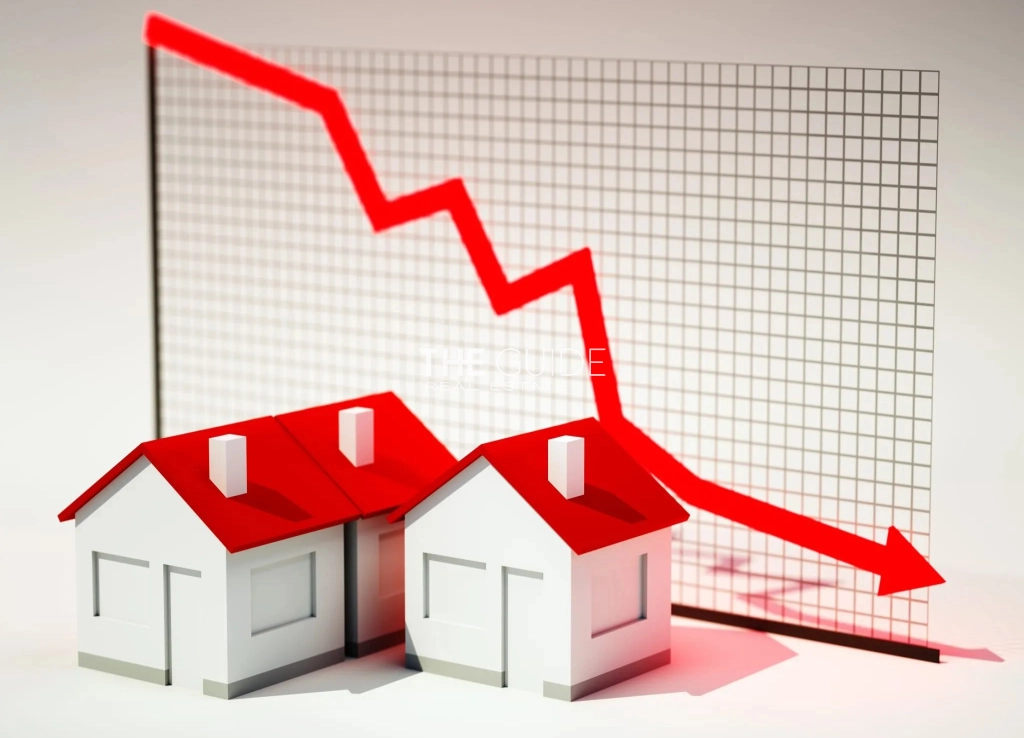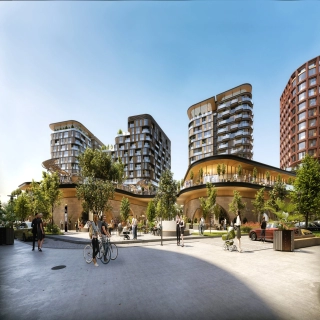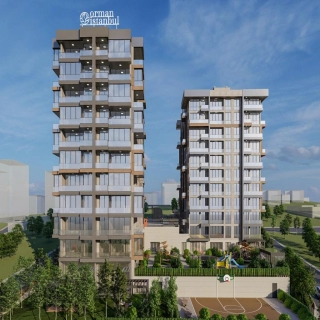Turkish Lira's Decline & Turkish Real Estate

The
depreciation of the Turkish currency has left potential investors pondering
their next move into the market. As the Turkish Lira experiences significant
declines, it presents an opportunity for foreign investors to enter the Turkish
real estate market at reduced prices.
The depreciation of the Lira makes this an ideal time for foreigners to acquire real estate at historically low prices. Turkey has traditionally been a significant destination for investment, and with the depreciated Lira, real estate is becoming even more appealing to international buyers.
How is the Turkish economy?
Turkey boasts a GDP of approximately US$720
billion, ranking as the 19th-largest economy globally. It is an emerging market
that attracts investors worldwide. The country is a leading producer of
agricultural products, textiles, motor vehicles, transportation equipment,
construction materials, consumer electronics, and home appliances.
Turkey operates primarily as a free market, with its economy driven by the industrial and service sectors, while traditional agriculture accounts for about 25% of employment.
However, the Turkish economy faces challenges in balancing macroeconomic stability with the need for sustained growth, contributing to periods of economic recession. One positive outcome of Turkey's currency depreciation is that foreign investors are finding Turkish companies increasingly attractive, potentially fueling an uptick in foreign investment.
Real estate investments and economic growth in
Turkey
Turkey's real estate market is a cornerstone of its economy. With the global pandemic and devaluation of the Lira, international investors are increasingly eyeing Turkish real estate. Recently, the Turkish real estate market has experienced rapid growth, driven by a surge in international investment.
The real estate sector plays a crucial role in Turkey's economic growth, bolstered by property acquisitions by foreign buyers. Despite the prolonged decline of the Turkish Lira, the Turkish economy remains resilient. Effective rules and regulations protect real estate transactions in Turkey.
Real estate investment in Turkey is considered a genuine opportunity due to good infrastructure, a supportive legal system, and a sound economic design. However, the Turkish economy is not immune to global economic crises.
Why is the Turkish Lira falling?
The
Turkish Lira has been steadily depreciating over an extended period. In 2014,
it took two Liras to purchase one U.S. dollar, whereas today, it takes more
than 13 Liras. According to World Bank data, Turkey's broad money supply
increased approximately 3.5 times between 2014 and 2020. This significant rise
has contributed to the depreciation of the Turkish Lira against the U.S.
dollar. Additionally, the value of a currency can also be influenced by its
demand in the global market.
· The 2018-2022 Turkey debt crisis stemmed from the Turkish
economy's excessive current account deficit and substantial private
foreign-currency-denominated debt. As a result, the Turkish lira lost
approximately 40% of its value, leading to significant challenges for citizens.
· The real estate market is booming, driven by high domestic demand for housing and increasing imports.
Turkish Lira’s depreciation effects on the
real estate market
Foreign investors are the primary beneficiaries of the Turkish market due to the benefits and incentives provided by the Turkish government for property purchases. The most significant incentive is the option to obtain Turkish citizenship by buying property worth USD 400,000. This policy benefits Turkey through increased foreign investment.
Despite
the decline of the Lira, Turkey continues to be one of the most promising real
estate markets for foreign investors. In 2020, foreign direct investments in
the real estate sector alone accounted for 57% of total FDI.
Why do home buyers choose Turkey for
investment?
Reasonable Prices:
Real estate prices in Turkey are highly competitive compared to many other countries, making properties affordable for investors.
Citizenship Opportunity:
Foreigners who purchase a property worth $400,000 or more are eligible to apply for Turkish citizenship for themselves and their families.
Low Cost of Living:
The cost of living in Turkey is very affordable, estimated to be lower than 62.7% of the United States. An average family spends only $1200 per month (excluding rent) to live comfortably.
Lower Property Tax:
Property tax in Turkey is just 0.001%, which is below the global average for property tax percentages.
Modern Construction:
Many construction companies in Turkey are adopting new technologies to enhance quality and infrastructure.
Great Location:
Turkey's strategic geographical location as a bridge between East and West makes it a hub for business. The pleasant climate further adds to its attractiveness.
Investors' Paradise:
The fluctuation of the Lira against the Dollar
and Euro presents opportunities for investors in Turkish real estate. Despite
the growing population, the demand for real estate exceeds supply, leading to
potentially high returns on sales and rentals.
Are property prices increasing in Turkey?
Turkey's depreciating currency has rapidly boosted real estate sales. Foreign investors are more interested than ever, seizing the opportunity presented by the favorable currency exchange rates. The surge in investments followed global headlines about the currency devaluation. Investors promptly booked flights to Turkey or contacted real estate brokers to capitalize on property purchases in the country.
Increased foreign investment has led to heightened cash sales in the country. Every decline in the Turkish lira translates into substantial profits for investors who purchase in their own currency. With rising demand, sales prices have also increased. Furthermore, the importation of construction supplies contributes to these price hikes.
The Turkish housing market remains a reliable investment option. International investors often benefit significantly from exchange rate fluctuations. With Turkey attracting investment from Europe and the Middle East, high demand has driven up property prices.
Reasons for the increased property prices in
Turkey
As demand outpaces supply, house prices in Turkey are rapidly increasing. Foreign investors are targeting prime investments, while residents are facing challenges in finding affordable housing. Several factors have driven the surge in demand for Turkish properties this year, resulting in a corresponding rise in property prices. Let's delve into these factors in detail.
• Citizenship by Investment: The Turkish government allows foreigners to
apply for citizenship if they invest $400,000 or more in property, which has
led to a surge in buyers and property prices. Obtaining a residence permit
through real estate has attracted investors from countries like Russia, Iran,
and Iraq.
• Property as an Investment: Many people are buying property as a hedge
against inflation. With decreasing interest rates and significant inflation,
investors are less inclined to keep their money in banks, driving up demand for
real estate as an alternative investment. Properties are increasingly being
purchased not for living but as profitable investments.
• Land Supply and Demand: Urbanization and foreign investment have
reduced available land for development each year. This scarcity has driven up
land costs, especially in premium locations like Antalya and Istanbul.
Developers are forced to pay high prices for available plots, which in turn
increases property prices.
• Growing Demand for Residential Properties: Despite the global pandemic, the Turkish
housing market has seen strong demand, with foreign purchases continuing
unabated. Investors have turned to online platforms for virtual property tours
and purchases.
• Cost of Building Materials: Property prices include the cost of building
materials, which are largely imported. Inflation and the COVID-19 pandemic have
driven these costs higher, leading to a significant increase in the price per
square meter.
• Luxury Construction: Modern constructions offer unique features to
stand out in the competitive market. What was once considered a luxury, such as
gyms, pools, playgrounds, and cafes, are now standard demands, contributing to
higher property prices.
• Simple Financing Options: Turkish banks offer financing options to both locals and foreigners, making property ownership more accessible. This availability of finance has encouraged more investors to enter the property market.
Government for the local citizens
The shortage of housing supply is a significant factor driving up property prices in Turkey. The country needs approximately 80,000 new homes annually to meet demand, and this scarcity has pushed house prices up by more than 10%, exacerbating the situation. In addition, soaring construction costs have further contributed to the imbalance.
To address this issue, the Turkish government is taking steps to make the housing market more affordable and accessible to local residents. The government's 2023 Vision Plan aims to stimulate the economy, with a specific focus on promoting the construction industry. Developers will receive support to build modern buildings and alleviate the housing shortage.
Turkey's real estate market has always been an attractive option for foreign property investors. If you are considering investing in Turkish real estate, The Guide Real Estate is here to assist you with our years of experience, extensive property listings, multilingual team, and reliable legal support.
Get in touch with us today!
More to read from us:
Related Articles
Latest Articles
Rate This Article
Recomended Properties
Astonishing Golden Horn Views Apartment for Sale
Nestled advantageously in the Eyup area, Rams Halic presents an authentic Istanbul experience along the iconic Golden...
New Financial City Apartments for Sale in
Discover Sinpas Finans Sehir, a prestigious project meticulously crafted for those who seek a private sanctuary to...
Luxury Homes for Sale in Istanbul Maslak
Hunting for a home that offers marvelous natural views while letting you stay in the heart of...
Luxurious Prime Located Turkey Properties Seba Central
Seba Central extends a contemporary opportunity for discerning buyers, harmonizing refined living quarters with a productive workspace,...
Luxury Homes for Sale in Istanbul Dap
Dap Yeni Levent presents a peaceful life in the financial hub of Istanbul. With its lush green...
Orman Istanbul Turkish citizenship apartments for sale
Orman Istanbul is a pristine and luxurious project in a beautiful district undergoing urban regeneration. Its features...





